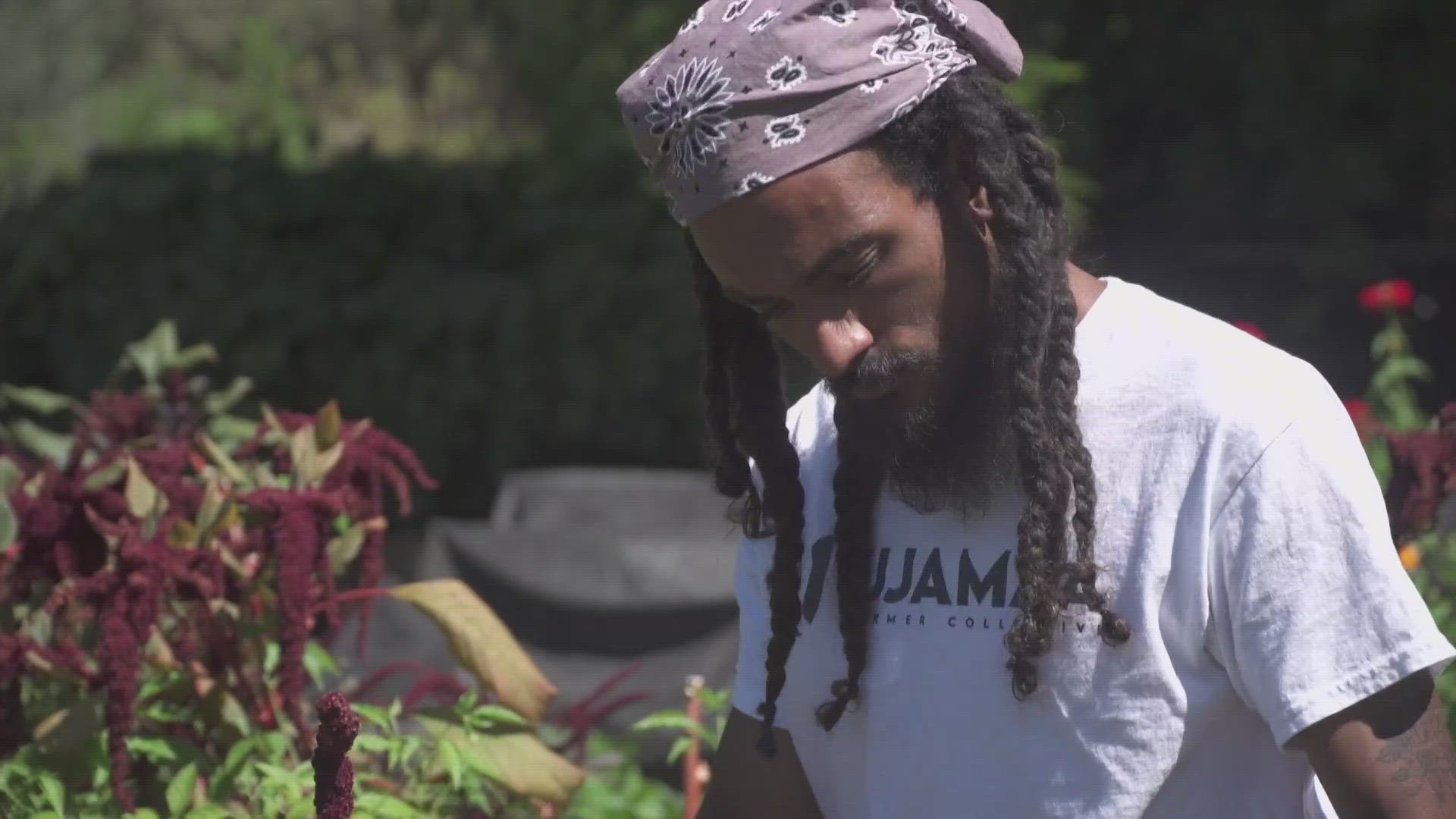SACRAMENTO COUNTY, Calif. — Each day, Nathaniel Brown tends to his land. He says he fell in love with gardening at a young age.
"When I'm able to see what I've created, it is very rewarding," Brown said. "I was definitely inspired by my grandma to get out and start planting. She really taught me gardening on a bigger scale. She had about a quarter-acre garden."
Brown eventually expanded gardening to farming. He started managing his own farm in Citrus Heights in 2019. It's called Brown Sugar Farm. There, he grows organic fruits, vegetables, herbs and flowers.
"We use brown sugar to ferment plants, to create a fermented plant juice that fertilizes the flowers, veggies and fruit trees," Brown said.
Brown also participates in farmers markets to help provide healthy and organic food options to underserved communities.
Farming comes with plenty of benefits, like establishing healthier communities and helping the environment thrive. But Brown says being a Black farmer comes with challenges, like land ownership. He currently has a half acre of land.
"I've been getting more ambitious and really into farming," Brown said. "I really want to take it to the next level."
Brown joined The Ujamaa Farmer Collective. It's a group of leaders, farmers, educators and food system advocates. The Ujamaa Farmer Collective is led by Nelson Hawkins. He's the founder of We Grow Farms, who serves as the Agriculture Project Manager.
The Collective is on a mission "to providing long-term, affordable land access for multiple existing BIPOC farmers and ranchers, struggling with land security."
According to the USDA, Black farmers owned more than 16 million acres of land in 1910. But now they have less than 5 million acres.
GET MORE RACE & CULTURE FROM ABC10:
►Explore the Race & Culture home page
►Watch Race & Culture videos on YouTube
►Subscribe to the Race and Culture newsletter
"Land access is the biggest struggle," Brown said. "And, although a farm can be on a piece of land, you might see it for one season. That doesn't mean it's always there."
According to the 2020 CDFA Farmer Equity Report, there are four key challenges facing socially disadvantaged farmers and ranchers in California. That includes:
- Land Tenure: Many socially disadvantaged farmers and ranchers do not have a stable, long-term arrangement for land. This affects the long-term sustainability of their businesses as well as the ability to incorporate conservation practices. Language: Socially disadvantaged farmers and ranchers do not always speak English as a first language. This can be prohibitive when seeking information about regulations, programs, marketing products, pest management, business management, and public engagement.
- Language: Socially disadvantaged farmers and ranchers do not always speak English as a first language. This can be prohibitive when seeking information about regulations, programs, marketing products, pest management, business management, and public engagement.
- Engagement with Agricultural Industry and Boards/Commissions: Socially disadvantaged farmers and ranchers do not often belong to industry groups, and therefore do not always receive information through industry meetings or via the internet. Historically, very few are members of CDFA boards and commissions.
- Access to Available Resources and Programs: Socially disadvantaged farmers and ranchers are not familiar with resources such as grants, technical assistance, and other helpful programs because they do not know these resources exist or have been unable to seek out the information.
The equity report explains that a socially disadvantaged group means "a group whose members have been subjected to racial, ethnic, or gender discrimination. These groups include, African Americans, American Indians, Alaskan Natives, Hispanics, Asian Americans, Native Hawaiians and Pacific Islanders, and Female farmers and ranchers of color."
The Ujamaa Farmer Collective is developing tangible solutions. The group secured $1.25 million in state funding to acquire 50 to 100 acres of land in Yolo County. Outside of ensuring land access, the group is also fundraising to develop a nonprofit organization to train and support beginner farmers.
Brown says it's about creating equitable opportunities for farmers of color, especially Black farmers.
"Our vision is, especially at The Ujamaa Farmer Collective, is that Black farmers will have a chance to get into not just urban agriculture, but real agriculture that's able to provide small family farms all across the state, country and really be an example," Brown said.
We want to hear from you!
The Race and Culture team's mission is to serve our diverse communities through authentic representation, community engagement and equitable reporting.
Accomplishing our goals of inclusive reporting requires hearing from you. Is there a person or place that you want us to highlight? Email us at raceandculture@abc10.com or fill out the form below.

